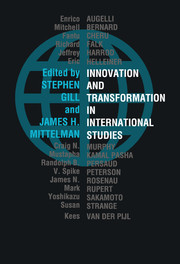Book contents
- Frontmatter
- Contents
- List of contributors
- Preface
- Acknowledgements
- Part I Rethinking and remaking the roots of global social and political theory
- Part II Political economy: the social and ecological anatomy of transformation
- 5 Ecology, political economy and the counter-movement: Karl Polanyi and the second great transformation
- 6 Braudelian reflections on economic globalisation: the historian as pioneer
- 7 Social forces and international political economy: joining the two IRs
- 8 Transnational class formation and state forms
- Part III Transformation, innovation and emancipation in global political and civil society
- Part IV Reflections on global order in the twenty-first century
- References
- Index of names
- Index of subjects
6 - Braudelian reflections on economic globalisation: the historian as pioneer
Published online by Cambridge University Press: 05 July 2011
- Frontmatter
- Contents
- List of contributors
- Preface
- Acknowledgements
- Part I Rethinking and remaking the roots of global social and political theory
- Part II Political economy: the social and ecological anatomy of transformation
- 5 Ecology, political economy and the counter-movement: Karl Polanyi and the second great transformation
- 6 Braudelian reflections on economic globalisation: the historian as pioneer
- 7 Social forces and international political economy: joining the two IRs
- 8 Transnational class formation and state forms
- Part III Transformation, innovation and emancipation in global political and civil society
- Part IV Reflections on global order in the twenty-first century
- References
- Index of names
- Index of subjects
Summary
In the 1990s, the focus of the field of International Political Economy (IPE) has come to be centred on the phenomenon of ‘economic globalisation’. It is a phenomenon that seems to both describe and explain many of the momentous changes in the global political economy of the late twentieth century. Although economic globalisation is now at the centre of the field's concerns, its precise meaning and significance remain hotly contested among International Political Economy scholars. This is hardly surprising. In this latest phase of its development, International Political Economy has begun to attract scholars from a wider diversity of disciplinary backgrounds than ever before. No longer is the field restricted to a dialogue between political scientists and economists. Geographers, sociologists, anthropologists and historians have also come to assume a central place within the field's debates. The task of arriving at a common intellectual approach to the study of economic globalisation for scholars from such a broad range of disciplinary backgrounds is obviously a daunting one.
As the definitional and conceptual debates surrounding the phrase ‘economic globalisation’ have heated up, one response has been to advocate the abandonment of the phrase altogether on the grounds that it is contributing more to confusion than to understanding. Although under contributing more to confusion than to understanding. Although understandable, this response is likely to be a futile one; ‘economic globalisation’ is a phrase that will not quickly disappear from academic and policy debates.
- Type
- Chapter
- Information
- Innovation and Transformation in International Studies , pp. 90 - 104Publisher: Cambridge University PressPrint publication year: 1997
- 7
- Cited by



